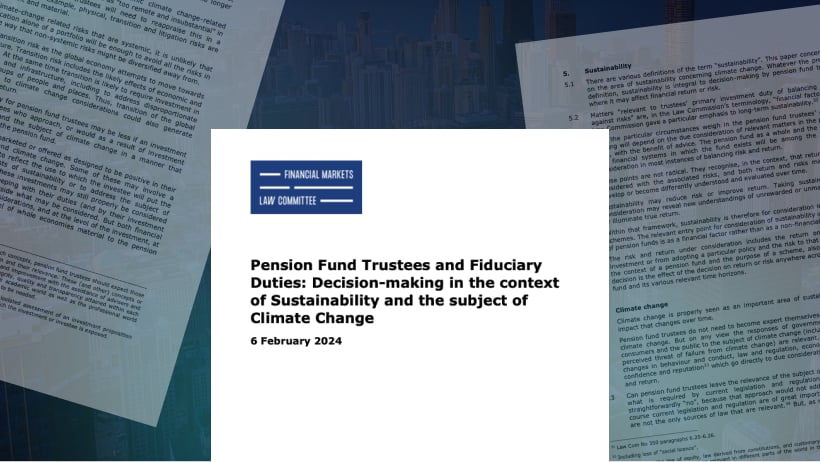New report clarifies role of sustainability as part of trustees' fiduciary duty

A recent paper by the Financial Markets Law Committee (FMLC) asserts that UK pension trustees must consider sustainability and climate change when balancing the risks and returns of their funds' investments.
Tumelo discusses the impact this could have on trustees' proxy-voting duty and their voting patterns.
A systemic instead of issuer approach
Systemic-risk stewardship is finally getting its moment in the sun after several years of campaigning by industry groups.
The FMLC's report has now clarified that: "... Pension fund trustees will address risk, including systemic risk, and return." This guidance hinges on the FMLC's assertion that sustainability and climate-change risks are financial, and therefore a vital part of the risk vs return equation.
From now on, trustees will be more able to consider the longer term implications of a proxy resolution rather than prioritise share price in the short term. In many cases, this could mean supporting previously "too remote and insubstantial" ESG shareholder resolutions if they now pose material risk to a fund's long-term returns.
This is a ringing endorsement for groups like the Shareholder Commons, whose Portfolio on the Ballot initiative has put a spotlight on initiatives and resolutions that focus on addressing systemic risks rather than company-specific issues.
According to the group: "System stewardship distinguishes investor activity that promotes the value of the system in which investments are embedded from investor activity intended to promote the value of individual investments."
Through its report, the FMLC leaves no room for doubt that trustees can justifiably reject short-term profits if "they create identifiable risks to the longer term sustainability of investment returns in the fund".
Consider all beneficiary timelines
The report also reminded trustees not to lose sight of differing time horizons. Decisions that guarantee returns in the short term may not hold in the longer run.
The FMLC's report stated:
"...relevant too is the effect of the subject of climate change on return or risk anywhere across the pension fund and including by reference to all applicable time horizons."
This point resonated widely during a recent industry event on fiduciary duty and risk management hosted by SG Pensions Enterprise. But some industry experts felt that the FMLC could have gone even further: several attendees called for more explicit guidance on time horizons, such as specifically addressing younger beneficiaries.
For example, it could be useful for trustees to consider the impact of their decisions on a pension funds' youngest (often 16) and oldest beneficiaries; an exercise already practised by one of the UK's largest pension funds.
This approach is not only relevant when deciding where to allocate assets, but also when voting on systemic-risk-related resolutions.
Proper oversight of delegated stewardship activity
Finally, the FMLC also encouraged trustees to take ownership of their stewardship activity and maintain proper oversight processes, even when this is delegated. The report stated:
"Pension fund trustees will wish to have processes for the proper communication of their stewardship expectations and proper oversight of the investment managers’ work to reassure themselves of its effectiveness in mitigating risks and supporting returns."
This echoes the recommendations of other regulatory initiatives such as the Vote Reporting Group, the Taskforce on Pension Scheme Voting Implementation, and Implementation Statements, highlighting its importance.
The implication: trustees must be able to scrutinise the votes cast by investment managers on their behalf to be able to hold those managers to account.
Ultimately, the FMLC's paper is a welcome guidance for the industry, reassuring trustees that their consideration of sustainability and climate risks are both valid and necessary.